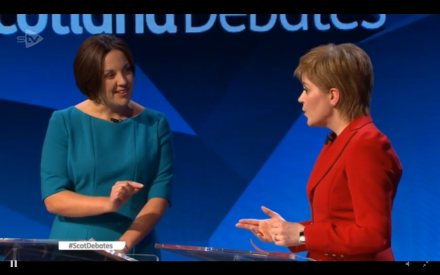
Scottish Labour are fighting back against an SNP majority by being bolder and going further than the status quo. Yet Kezia Dugdale has a hard time tackling the perception Labour is an offshoot of a Tory Government in England – an image pushed by Nicola Sturgeon in last night’s STV debate.
Dugdale, the Scottish Labour leader, took a twin approach of fighting the SNP on their timidity, or even hypocrisy, for demanding new powers for the Scottish Parliament – and then failing to use them. Scottish Labour has pledged to introduce a 50p top rate of tax but Nicola Sturgeon has repeatedly refused to fully support such a policy.
When Dugdale was confronted by Ruth Davidson she attacked the leader of the Scottish Conservatives for planning “stealth taxes”. The Tories are in favour of introducing prescription charges and university fees – an approach they argue will cost more for those who can afford to pay while raising revenue for other public services.
Dugdale’s approach is to cultivate an image of opposition to Conservative austerity – and going further than the SNP in doing so. Yet the perception of Labour as being part of a Westminster crowd will be hard to shake. Labour will have a tough time separating themselves from a perception of being Tory-lite – Davidson said she would be proud to stand with Labour once more to campaign against independence, and Sturgeon attacked, claiming Labour had condemned Scots to another Conservative Government for which they did not vote.
Dugdale had a hard time when Sturgeon asked her to apologise for her role in the referendum, with the 34-year-old saying she would be proud to vote no again. When Britain will be set for at least another four years of Conservative austerity, Dugdale is going to have a hard time convincing people that Labour, regardless of whether or not the country wants another referendum.
In fact, that constitutional question loomed large over the debate. The SNP leader was attacked by her rivals for wanting to re-run the referendum. She had a hard time defending her previous claim the referendum was a “once in a generation” decision – only to then say she would want another in as little as two years. It is, however, a referendum Sturgeon sounds confident she will win. This argument generated one of the biggest rounds of applause when Davidson attacked Sturgeon for asking for independence over and over again until she got the answer she wanted.
Voting intentions for the Scottish Parliament throughout February suggest Labour on course to lose 1/3 of its seats pic.twitter.com/wE5HvHVrbe
— Britain Elects (@BritainElects) March 3, 2016
The differences between this debate and those in the General Election were striking. An image of three female party leaders – compared with the all-male line-up of David Cameron, Ed Miliband and Nick Clegg for the three main parties in one of last year’s televised jousts – gave the debate a different feel.
The range of issues highlighted by the Scottish audience contrasted with those we would expect in a general election. Immigration did not get a mention but a strongly anti-Trident question did come up.
The SNP’s record on education, in particular on schools, allowed Dugdale to go on the offensive, along with Scottish Lib Dem leader Willie Rennie. Dugdale argued that the increase in taxes would give more money to schools, while Rennie outlined how under the SNP Scotland has dropped from having one of the best education systems in the world to one that is simply average.
While social issues of healthcare, education and disability arose, it is Scotland’s identity in the face of new parliamentary powers that hung over the party leaders. Scotland’s new powers are unprecedented, making the stakes of this debate much higher in the eyes of its audience.
According to several opinion polls, Scottish Labour stands to lose a third of its seats in May, with the SNP projected to win three seats and the Conservatives and Greens also expected to make gains. The impact of the Tories’ catastrophic Budget is yet to be seen but, when set against Sturgeon’s attack line that Labour fought to keep Scotland as part of Tory Britain, it presents a challenge for Dugdale to capitalise on the disarray of the Westminster Government.
Dugdale’s strategy is to place Labour as a party of change – being bolder than the SNP – without going so far as to back Scottish independence. She’s got a tough fight ahead of her.




More from LabourList
‘Labour is being badly misled on housing’
Reeves bets on patience over populism
‘Energy efficiency changes must work for older private renters’